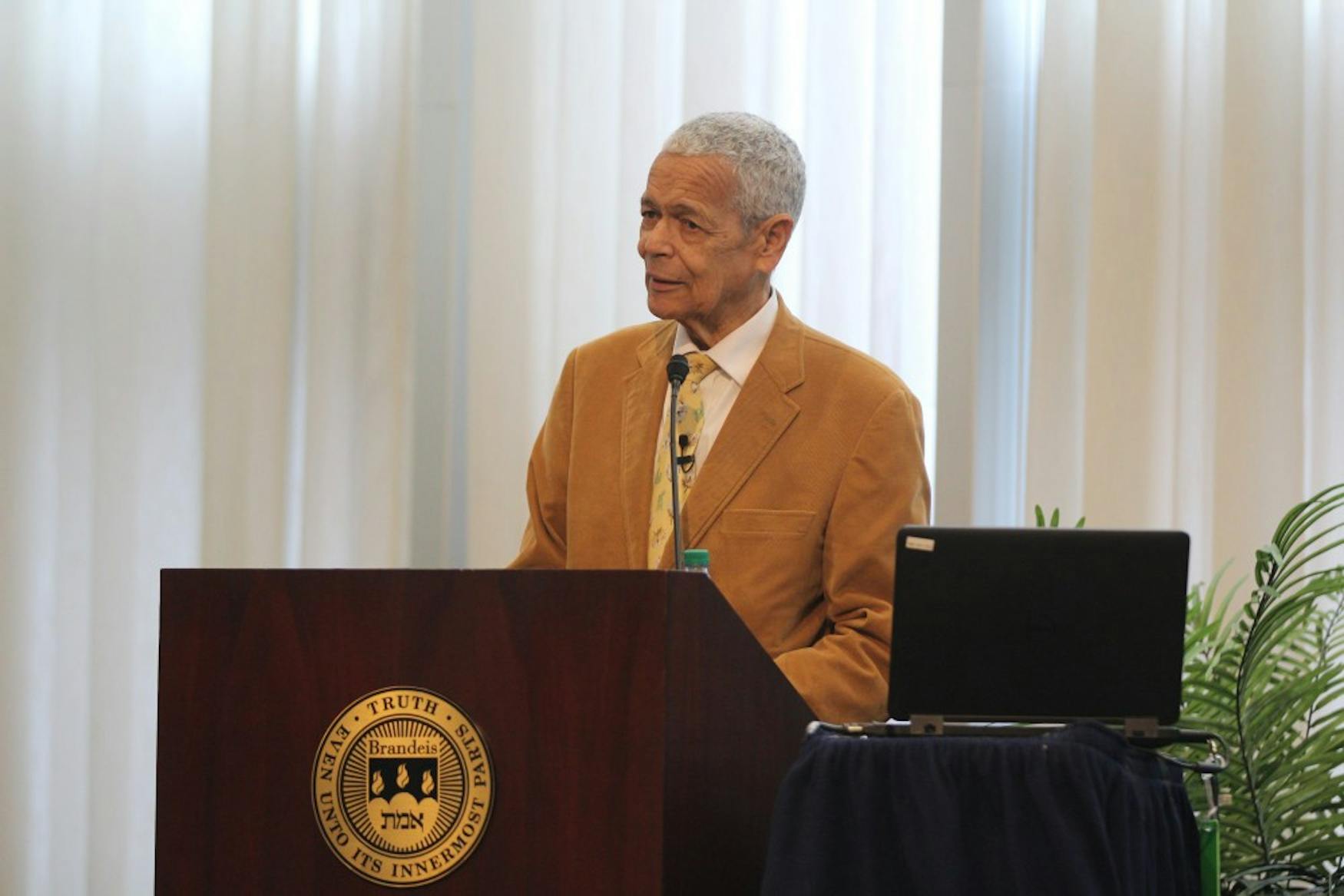Civil Rights activist Julian Bond speaks at University
On Tuesday March 31, Rapaporte Hall erupted in applause before Julian Bond—a civil rights activist, politician, professor, writer and actor—even spoke a word. Bond gave a talk titled, “How I Got into the Movement.” His lecture was part of a three-day event organized by the Brandeis International Center for Ethics, Justice, and Public Life.
Atop the podium, University President Frederick Lawrence greeted Bond and handed him a certificate for the Brandeis Richman Fellowship Award. As explained by Prof. Chad Williams (AAAS), the Richman Fellowship Award is presented to “individuals active in public life whose contributions have had a significant impact on improving American society, strengthening democratic institutions, advancing social justice or increasing opportunities for all citizens to realize and share in the benefits of this nation.” According to the University’s website, the award was created by Dr. Carol Richman Saivetz ’69 and her children, Michael Saivetz ’97 and Aliza Saivetz Glasser ’01, in honor of Carol’s parents, Fred and Rita Richman.
Bond began his talk by describing his early engagement in the Civil Rights Movement, which included organizing student activist groups at his alma mater, Morehouse College, and facilitating sit-in protests at downtown Atlanta lunch counters. Bond recounted the story of his first arrest at age 20, when he led a group of students into the segregated cafeteria in the basement of Atlanta City Hall.
Bond described his experience studying under the tutelage of the Rev. Dr. Martin Luther King Jr. in 1962. Bond was one of eight students in King’s social philosophy course at Morehouse College—the only college course ever taught by King.
Bond then spoke about his major contributions to the formation of the Student Non-violent Coordinating Committee, an organization devoted to eradicating segregation and giving the younger black population a more prominent voice in the Civil Rights Movement. He explained how the organization endorsed the tactic of nonviolent resistance when protesting racial inequality, arguing that that was the key to the organization’s success. Bond served as SNCC’s national communications director for five years, from 1961 to 1966.
Afterward, Bond transitioned into a discussion of his career in politics. He told the story of how he was elected into the Georgia House of Representatives in 1965 but soon after was ousted by his colleagues because he opposed the war in Vietnam. When he ran for the vacant position the following year, he was re-elected and then expelled from the Georgia House a second time. He was re-elected to the house for a third time in 1966, and in December of that year, the Supreme Court ruled that the Georgia House had violated Bond’s rights by refusing him his seat. Bond subsequently served four terms in the Georgia House of Representatives. Bond then spoke about his six terms of service in the Georgia senate from 1975 to 1986. In 1968, he was the first black man ever nominated for the U.S. vice presidency by Wisconsin’s Ted Warshafsky, vice chairman of Eugene McCarthy’s delegation at the Democratic National Convention. Bond, then 28 years old and too young for the office, respectfully withdrew his name.
Bond then described how, weary of political life, he helped found the Southern Poverty Law Center, a law firm which works to represent the underprivileged, eliminate discrimination based on race and gender and expose the malicious activity of hate groups. He served as its president from 1971 to 1979. In 1999 he was selected to serve as chairman of the National Association for the Advancement of Colored People, a post at which he served for 10 years.
Bond also discussed his decision to follow in the footsteps of his father and enter the academic world. He spoke about courses he taught at Drexel University, Harvard University, the University of Virginia and about his current post as a professor at American University.
In addition to his continued efforts to achieve equal opportunity for the African-American community, Bond plays an active role in the fight for lesbian, gay, bisexual, transsexual and queer rights. “When I’m asked ‘are gay rights civil rights?’ My answer is always, ‘of course they are,’” Bond said. “Civil rights are positive legal prerogatives—the right to equal treatment in a court of law, and these rights are shared by everyone … Gay and lesbian rights are not special rights in any way. It isn’t special to be free from discrimination.”



Please note All comments are eligible for publication in The Justice.